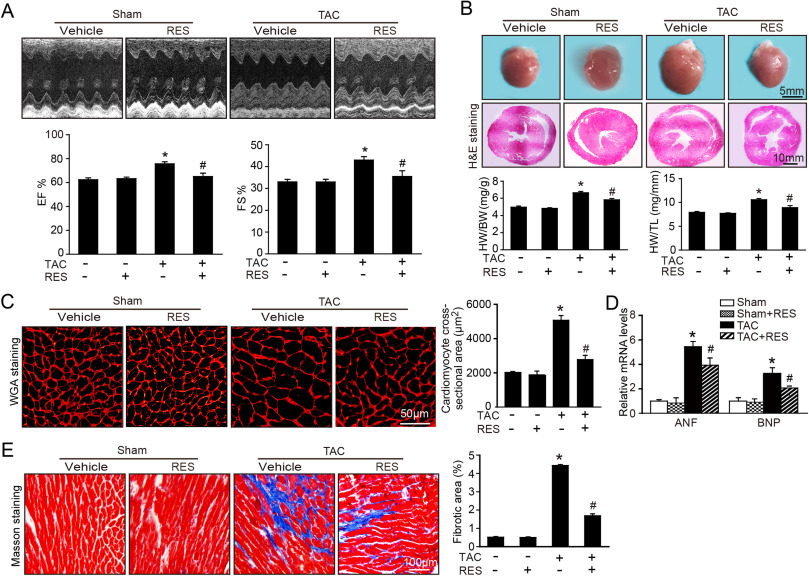Redox Biology ( IF 10.7 ) Pub Date : 2018-11-01 , DOI: 10.1016/j.redox.2018.10.021
Chen Chen , Lei-Xin Zou , Qiu-Yue Lin , Xiao Yan , Hai-Lian Bi , Xin Xie , Shuai Wang , Qing-Shan Wang , Yun-Long Zhang , Hui-Hua Li

|
持续的心脏肥大是心力衰竭(HF)和死亡的主要原因。最近的研究表明,白藜芦醇(RES)在肥厚性疾病中起保护作用。但是,所涉及的分子机制尚未完全阐明。在这项研究中,小鼠的肥大性心肌重构是由横动脉主动脉收缩(TAC)引起的压力超负荷建立的。通过超声心动图和有创压力量分析评估心脏功能。通过小麦胚芽凝集素染色检测心肌细胞大小。检查信号传导介质和肥大标志物的蛋白质和基因表达。我们的结果表明,RES的使用显着抑制了压力超负荷引起的心脏肥大,纤维化和细胞凋亡,并改善了小鼠的体内心脏功能。RES还逆转了预先建立的肥大,并恢复了慢性压力超负荷引起的收缩功能障碍。此外,RES处理可阻止TAC诱导的免疫蛋白酶体活性和催化亚基表达(β1i,β2i和β5i)的增加,从而抑制PTEN降解,从而导致AKT / mTOR失活和AMPK信号激活。此外,在体内和体外通过特异性抑制剂VO-Ohpic阻断PTEN可以显着减弱RES对心肌肥大的抑制作用。综上所述,我们的数据表明RES是免疫蛋白酶体活性的新型抑制剂,并且可能代表用于治疗肥大性疾病的有前途的治疗剂。RES处理可阻止TAC诱导的免疫蛋白酶体活性和催化亚基表达(β1i,β2i和β5i)的增加,从而抑制PTEN降解,从而导致AKT / mTOR失活和AMPK信号激活。此外,在体内和体外通过特异性抑制剂VO-Ohpic阻断PTEN可以显着减弱RES对心肌肥大的抑制作用。综上所述,我们的数据表明RES是免疫蛋白酶体活性的新型抑制剂,并且可能代表用于治疗肥大性疾病的有前途的治疗剂。RES处理可阻止TAC诱导的免疫蛋白酶体活性和催化亚基表达(β1i,β2i和β5i)的增加,从而抑制PTEN降解,从而导致AKT / mTOR失活和AMPK信号激活。此外,在体内和体外通过特异性抑制剂VO-Ohpic阻断PTEN可显着减弱RES对心肌细胞肥大的抑制作用。综上所述,我们的数据表明RES是免疫蛋白酶体活性的新型抑制剂,并且可能代表用于治疗肥大性疾病的有前途的治疗剂。通过特异性抑制剂VO-Ohpic阻断PTEN可以显着减弱RES在体内和体外对心肌肥大的抑制作用。综上所述,我们的数据表明RES是免疫蛋白酶体活性的新型抑制剂,并且可能代表用于治疗肥大性疾病的有前途的治疗剂。通过特异性抑制剂VO-Ohpic阻断PTEN可以显着减弱RES在体内和体外对心肌肥大的抑制作用。综上所述,我们的数据表明RES是免疫蛋白酶体活性的新型抑制剂,并且可能代表用于治疗肥大性疾病的有前途的治疗剂。

"点击查看英文标题和摘要"

































 京公网安备 11010802027423号
京公网安备 11010802027423号